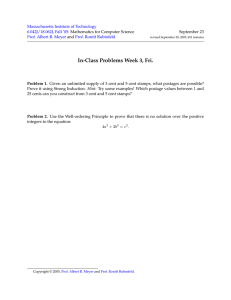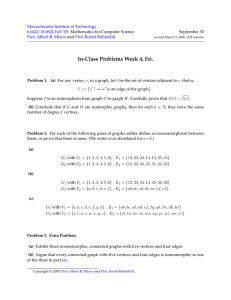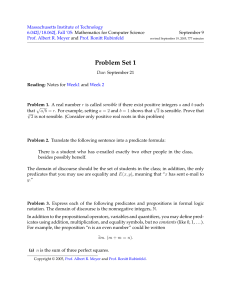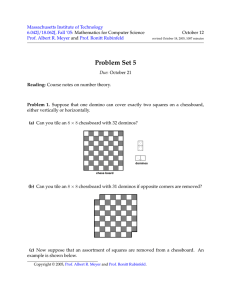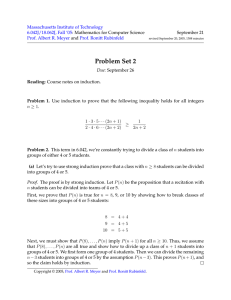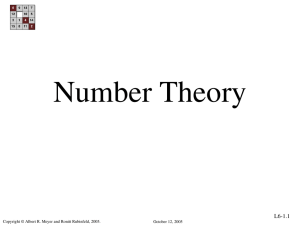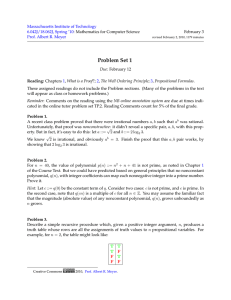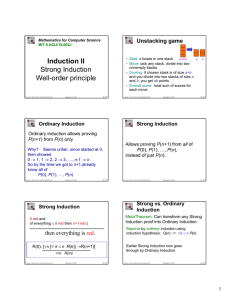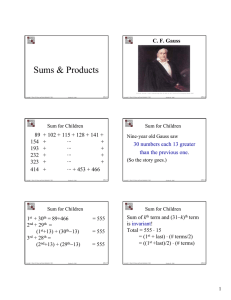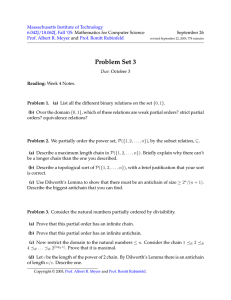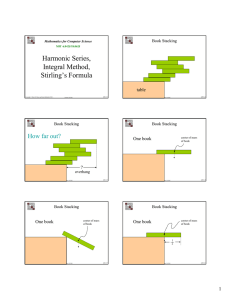Document 13594373
advertisement
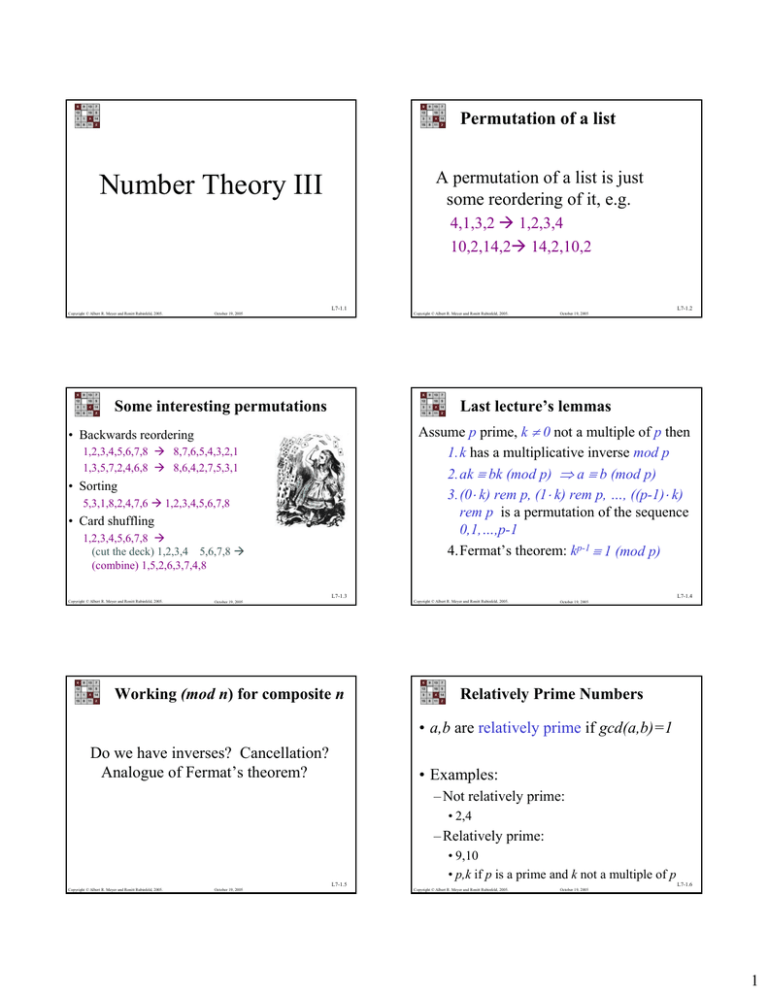
Permutation of a list
A permutation of a list is just
some reordering of it, e.g.
Number Theory III
4,1,3,2 Æ 1,2,3,4
10,2,14,2Æ 14,2,10,2
L7-1.1
Copyright © Albert R. Meyer and Ronitt Rubinfeld, 2005.
L7-1.2
Copyright © Albert R. Meyer and Ronitt Rubinfeld, 2005.
October 19, 2005
Some interesting permutations
October 19, 2005
Last lecture’s lemmas
Assume p prime, k ≠ 0 not a multiple of p then
1.k has a multiplicative inverse mod p
2.ak ≡ bk (mod p) ⇒ a ≡ b (mod p)
3.(0⋅ k) rem p, (1⋅ k) rem p, …, ((p-1)⋅ k)
rem p is a permutation of the sequence
0,1,…,p-1
4.Fermat’s theorem: kp-1 ≡ 1 (mod p)
• Backwards reordering
1,2,3,4,5,6,7,8 Æ 8,7,6,5,4,3,2,1
1,3,5,7,2,4,6,8 Æ 8,6,4,2,7,5,3,1
• Sorting
5,3,1,8,2,4,7,6 Æ 1,2,3,4,5,6,7,8
• Card shuffling
1,2,3,4,5,6,7,8 Æ
(cut the deck) 1,2,3,4 5,6,7,8 Æ
(combine) 1,5,2,6,3,7,4,8
L7-1.3
Copyright © Albert R. Meyer and Ronitt Rubinfeld, 2005.
L7-1.4
Copyright © Albert R. Meyer and Ronitt Rubinfeld, 2005.
October 19, 2005
Working (mod n) for composite n
October 19, 2005
Relatively Prime Numbers
• a,b are relatively prime if gcd(a,b)=1
Do we have inverses? Cancellation?
Analogue of Fermat’s theorem?
• Examples:
– Not relatively prime:
• 2,4
– Relatively prime:
• 9,10
• p,k if p is a prime and k not a multiple of p
L7-1.5
Copyright © Albert R. Meyer and Ronitt Rubinfeld, 2005.
October 19, 2005
L7-1.6
Copyright © Albert R. Meyer and Ronitt Rubinfeld, 2005.
October 19, 2005
1
Inverses mod n
Cancellation
Thm. If k relatively prime to n then
k has an inverse k-1 such that
kk-1 ≡ 1 (mod n)
Corr: If k relatively prime to n then
ak ≡ bk (mod n) ⇒
a ≡ b (mod n)
L7-1.7
Copyright © Albert R. Meyer and Ronitt Rubinfeld, 2005.
L7-1.8
Copyright © Albert R. Meyer and Ronitt Rubinfeld, 2005.
October 19, 2005
October 19, 2005
Euler φ function
Permutations
φ(n) = |{ j | 1 ≤ j < n gcd(j,n) = 1}|
If k relatively prime to n and k1…kr are all
integers relatively prime to n for which
0 < ki < n then
(k1⋅ k)rem n, (k2⋅ k)rem n, …,(kr⋅k)rem n
is a permutation of the sequence k1,…,kr
Examples:
φ (7) = 6
1,2,3,4,5,6
φ(49) = 42
1,2,3,4,5,6,7,8,9,10,11,12,13,14,15,…
φ (12) = 4
1,2,3,4,5,6,7,8,9,10,11
L7-1.9
Copyright © Albert R. Meyer and Ronitt Rubinfeld, 2005.
L7-1.10
Copyright © Albert R. Meyer and Ronitt Rubinfeld, 2005.
October 19, 2005
Euler φ function
October 19, 2005
Euler’s Theorem
φ(n) = |{ j | 1 ≤ j < n gcd(j,n) ≡ 1}|
Theorem:
1. a,b relatively prime ⇒ φ(ab)= φ(a)φ(b)
2. p prime ⇒ φ(pk)= pk – pk-1 for k ≥ 1
If k relatively prime to n then
kφ(n) ≡ 1 (mod n)
Examples:
φ (7) = 7-1=6
1,2,3,4,5,6
Note: If k relatively prime to n
then kφ(n)-1 is k-1
φ(49) = 49-7=42
1,2,3,4,5,6,7,8,9,10,11,12,13,14,15,…
φ (12) = φ (22) ⋅ φ (3) = 2 ⋅ 2 = 4
1,2,3,4,5,6,7,8,9,10,11
Copyright © Albert R. Meyer and Ronitt Rubinfeld, 2005.
October 19, 2005
L7-1.11
L7-1.12
Copyright © Albert R. Meyer and Ronitt Rubinfeld, 2005.
October 19, 2005
2
RSA Public Key Encryption
Beforehand
•
•
•
Receiver generates primes p,q
n=pq (so φ(n) = (p-1)(q-1))
Selects e such that gcd(e,(p-1)(q-1))=1
– e is public key, distributes e and n widely
•
Computes d such that
de ≡ 1 (mod (p-1)(q-1))
– d is secret key, keeps it hidden
L7-1.13
Copyright © Albert R. Meyer and Ronitt Rubinfeld, 2005.
L7-1.14
Copyright © Albert R. Meyer and Ronitt Rubinfeld, 2005.
October 19, 2005
RSA
October 19, 2005
Why does this work?
• Encoding: sender sends m’ = me rem n
• Why is (m’)d rem n = (me rem n)d rem n the
same as the original message?
• Decoding: receiver decrypts as
m=(m’)d rem n
– Will see why in class problem 2
L7-1.15
Copyright © Albert R. Meyer and Ronitt Rubinfeld, 2005.
L7-1.16
Copyright © Albert R. Meyer and Ronitt Rubinfeld, 2005.
October 19, 2005
October 19, 2005
Is it secure?
Class Problems 1 and 2
• What notion of security? Against which
kinds of attacks?
• Can we at least show that deciphering the
message implies the ability to factor n?
– We don’t know how…
– see homework problem
L7-1.17
Copyright © Albert R. Meyer and Ronitt Rubinfeld, 2005.
October 19, 2005
L7-1.18
Copyright © Albert R. Meyer and Ronitt Rubinfeld, 2005.
October 19, 2005
3
